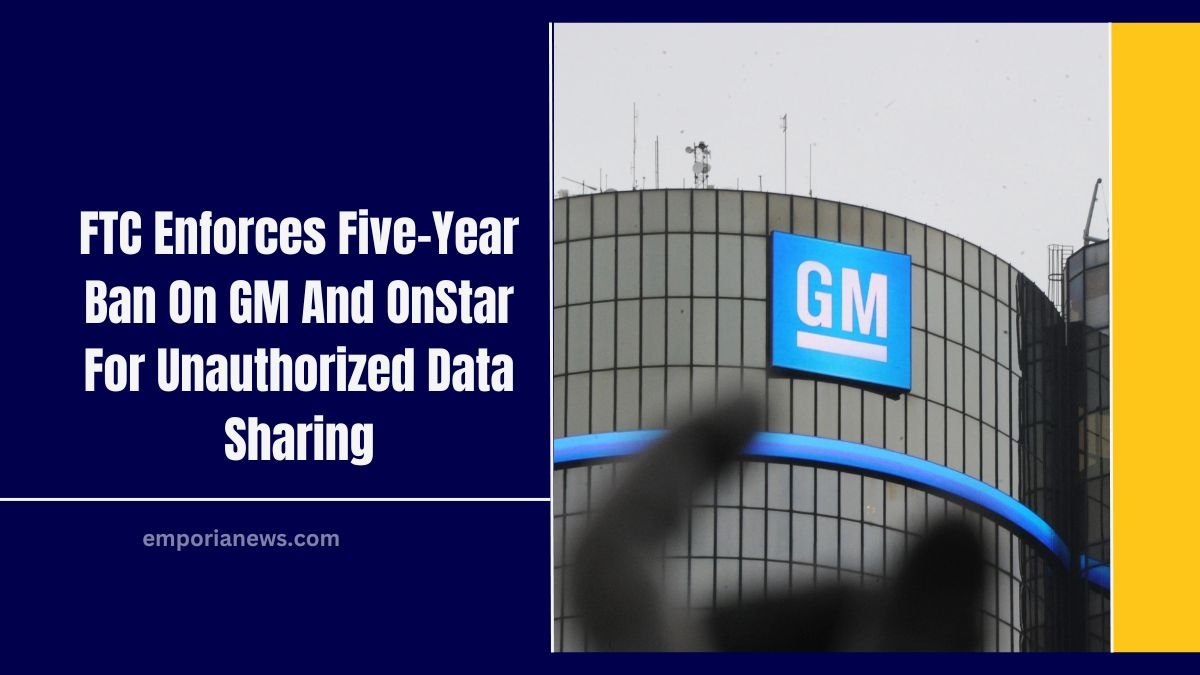In a significant move to protect consumer privacy, the Federal Trade Commission (FTC) has imposed a five-year ban on General Motors (GM) and its subsidiary OnStar from sharing drivers’ geolocation and driving behavior data with consumer reporting agencies.
This action addresses allegations that GM collected and sold sensitive driver information without obtaining proper consent from vehicle owners.
Background of the Allegations
Investigations revealed that GM, through its OnStar Smart Driver program, collected detailed data on drivers’ habits, including precise geolocation, instances of hard braking, rapid acceleration, and speeds exceeding 80 mph.
This data was reportedly gathered as frequently as every three seconds for some users. The collected information was then sold to third parties, such as LexisNexis Risk Solutions and Verisk Analytics, who, in turn, provided it to insurance companies.
This practice potentially led to increased insurance premiums for drivers, often without their knowledge or explicit consent.
FTC’s Findings and Settlement Terms
The FTC’s investigation concluded that GM employed deceptive enrollment processes for the OnStar Smart Driver program.
Consumers were not adequately informed that their driving data would be collected and sold to third parties. As part of the settlement, GM and OnStar are prohibited from sharing sensitive data with consumer reporting agencies for five years. Additionally, they must:
- Obtain explicit consumer consent prior to collecting any driving data.
- Provide mechanisms for consumers to access, limit, and delete their collected data.
- Enhance transparency regarding their data collection and sharing practices.
FTC Chair Lina M. Khan emphasized the gravity of the situation, stating, “GM monitored and sold people’s precise geolocation data and driver behavior information, sometimes as often as every three seconds.”
She further noted that the FTC’s action aims to safeguard Americans’ privacy and protect them from unchecked surveillance.
GM’s Response and Policy Changes
In response to the allegations and subsequent settlement, GM announced the discontinuation of the OnStar Smart Driver program and terminated its partnerships with LexisNexis and Verisk Analytics.
The company has committed to unenrolling all customers from the program and is working on implementing enhanced privacy controls aimed at greater transparency.
A GM spokesperson stated, “When it comes to privacy, keeping our customers’ data safe is a top priority for us.” Under the leadership of their new Chief Privacy Officer, GM has updated its privacy policy to enhance clarity and accessibility.
Legal Repercussions and Ongoing Litigation
The unauthorized data-sharing practices have also led to legal challenges. Numerous class-action lawsuits have been filed against GM, OnStar, LexisNexis, and Verisk Analytics.
These lawsuits allege that the companies shared sensitive driver data without consent, including details about mileage, speed, braking, and acceleration. As of November 1, 2024, a total of 32 lawsuits have been consolidated in a Georgia federal court.
Consumer Impact and Privacy Concerns
The revelation of these practices has raised significant concerns among consumers. Many drivers were unaware that their driving habits were being monitored so closely and that this information could influence their insurance rates.
For instance, Brant McDonald, a resident of Valdosta, Georgia, discovered that his driving data had been tracked extensively, resulting in a 325-page report detailing his driving history over a short period.
He expressed his dismay, stating, “I never imagined that every trip, every turn, every time I press the gas, press the brake, that someone is looking over my shoulder and taking note of that and sending it to the insurance company.”
| Date | Event Description |
|---|---|
| March 2024 | Investigations reveal GM’s unauthorized sharing of driver data. |
| April 2024 | GM discontinues the OnStar Smart Driver program and ends partnerships with data brokers. |
| November 2024 | 32 class-action lawsuits consolidated in Georgia federal court. |
| January 2025 | FTC imposes a five-year ban on GM and OnStar from sharing driver data without consent. |
The FTC’s decisive action against GM and OnStar underscores the importance of consumer privacy in an increasingly connected world.
This case serves as a cautionary tale for corporations about the repercussions of unauthorized data collection and sharing.
As technology continues to evolve, it is imperative for companies to prioritize transparency and obtain explicit consent when handling sensitive consumer information.




